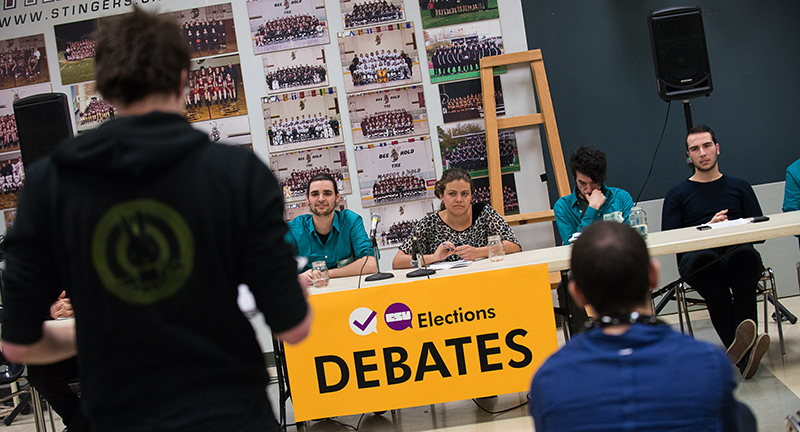Humdrum affair enlivened by stances over BDS movement
Students interested in seeing for themselves the candidates running for Concordia Student Union (CSU) elections had the chance to do so last week.
Most of the executives were on hand to introduce themselves in a standard affair that was notably calm and civil. This was perhaps owing to the fact that aside from three independents the remaining candidates are all part of the Community Action slate.
The sole moment of contention came when VP Clubs & Internal independent candidate Alexandre Laroche and president hopeful Terry Wilkings differed on a question brought to them about the CSU’s take on the Boycott, Divest, Sanction (BDS) movement.

Posed by representatives of Israel on Campus, the question asked whether the stance, voted in late last semester, had the support of the candidates. BDS seeks to boycott services and goods from Israel based on its alleged human-rights violations against the Palestinians.
In a debate with otherwise very little rebuttals the BDS question proved lively.
“It just wasn’t the right answer,” said Laroche of the previous slate’s handling of the issue. Laroche, who describes himself as passionately against BDS, thinks the motion should never have passed.
“The CSU has no right to dictate something like that. It’s understandable … that some are pro-Palestinian and pro-Israel [and] we live in a country and a university that has the freedom to take stances on the individual level,” Larouche said. “But in the university as a whole you’re not just representing those thousand students who signed the petition. You’re representing 35,000. It’s important to think about the silent majority. It’s tricky to pass something that controversial when you have quorum-only.”
November’s vote was decided by just under 2,600 voters, with 1,276 voting in the affirmative and 1,067 in the negative.
“I really just want to dispel the narrative of how its the CSU that’s imposing these kinds of positions on the student body,” replied Wilkings after the debate. “This was a petition brought to us.”
Wilkings also said Concordia University was the only school so far to use such democratic means to reach the decision. “The CSU is the only student union to my knowledge to take a position on this topic through a referendum. There are dozens of universities who have arrived at the same position as us, but they’ve arrived at that position through a vote of the board or … a decision of people in the room.”
He said the CSU wasn’t necessarily the best way of debating the issue, with many other paths to dialogue available on campus. He cited the Muslim Jewish Feminist Alliance club and its mandate of co-existence and dialogue as an example.
Wilkings continued: “The will of the student body came out to a certain outcome, and we’re supposed to respect the outcome of the referendum process. There are many social issues that are being mobilized around and I don’t think the CSU should have the ability to prevent students from following through with the internal mechanisms of consultation.”
For more information on the election and the referendum questions, go to csuelections.wordpress.com. CSU elections will be taking place from March 24 to 26.



